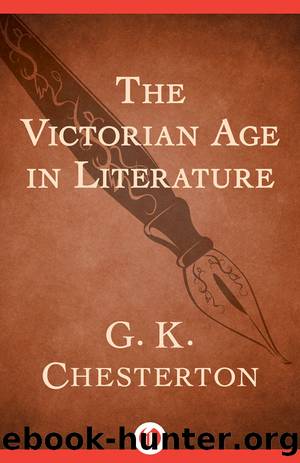The Victorian Age in Literature by G. K. Chesterton

Author:G. K. Chesterton
Language: eng
Format: epub
Publisher: Open Road Integrated Media
Published: 2015-08-10T15:22:11+00:00
CHAPTER III: THE GREAT VICTORIAN POETS
What was really unsatisfactory in Victorian literature is something much easier to feel than to state. It was not so much a superiority in the men of other ages to the Victorian men. It was a superiority of Victorian men to themselves. The individual was unequal. Perhaps that is why the society became unequal: I cannot say. They were lame giants; the strongest of them walked on one leg a little shorter than the other. A great man in any age must be a common man, and also an uncommon man. Those that are only uncommon men are perverts and sowers of pestilence. But somehow the great Victorian man was more and less than this. He was at once a giant and a dwarf. When he has been sweeping the sky in circles infinitely great, he suddenly shrivels into something indescribably small. There is a moment when Carlyle turns suddenly from a high creative mystic to a common Calvinist. There are moments when George Eliot turns from a prophetess into a governess. There are also moments when Ruskin turns into a governess, without even the excuse of sex. But in all these cases the alteration comes as a thing quite abrupt and unreasonable. We do not feel this acute angle anywhere in Homer or in Virgil or in Chaucer or in Shakespeare or in Dryden; such things as they knew they knew. It is no disgrace to Homer that he had not discovered Britain; or to Virgil that he had not discovered America; or to Chaucer that he had not discovered the solar system; or to Dryden that he had not discovered the steam-engine. But we do most frequently feel, with the Victorians, that the very vastness of the number of things they know illustrates the abrupt abyss of the things they do not know. We feel, in a sort of way, that it is a disgrace to a man like Carlyle when he asks the Irish why they do not bestir themselves and re-forest their country: saying not a word about the soaking up of every sort of profit by the landlords which made that and every other Irish improvement impossible. We feel that it is a disgrace to a man like Ruskin when he says, with a solemn visage, that building in iron is ugly and unreal, but that the weightiest objection is that there is no mention of it in the Bible; we feel as if he had just said he could find no hair-brushes in Habakkuk. We feel that it is a disgrace to a man like Thackeray when he proposes that people should be forcibly prevented from being nuns, merely because he has no fixed intention of becoming a nun himself. We feel that it is a disgrace to a man like Tennyson, when he talks of the French revolutions, the huge crusades that had recreated the whole of his civilisation, as being âno graver than a schoolboyâs barring out.â
Download
This site does not store any files on its server. We only index and link to content provided by other sites. Please contact the content providers to delete copyright contents if any and email us, we'll remove relevant links or contents immediately.
The Power of Myth by Joseph Campbell & Bill Moyers(1068)
A Social History of the Media by Peter Burke & Peter Burke(988)
Half Moon Bay by Jonathan Kellerman & Jesse Kellerman(987)
Inseparable by Emma Donoghue(983)
The Nets of Modernism: Henry James, Virginia Woolf, James Joyce, and Sigmund Freud by Maud Ellmann(914)
The Spike by Mark Humphries;(812)
The Complete Correspondence 1928-1940 by Theodor W. Adorno & Walter Benjamin(789)
A Theory of Narrative Drawing by Simon Grennan(783)
Culture by Terry Eagleton(776)
Ideology by Eagleton Terry;(743)
World Philology by(719)
Farnsworth's Classical English Rhetoric by Ward Farnsworth(715)
Game of Thrones and Philosophy by William Irwin(712)
Bodies from the Library 3 by Tony Medawar(709)
High Albania by M. Edith Durham(705)
Adam Smith by Jonathan Conlin(695)
A Reader’s Companion to J. D. Salinger’s The Catcher in the Rye by Peter Beidler(689)
Monkey King by Wu Cheng'en(654)
Comic Genius: Portraits of Funny People by(653)
